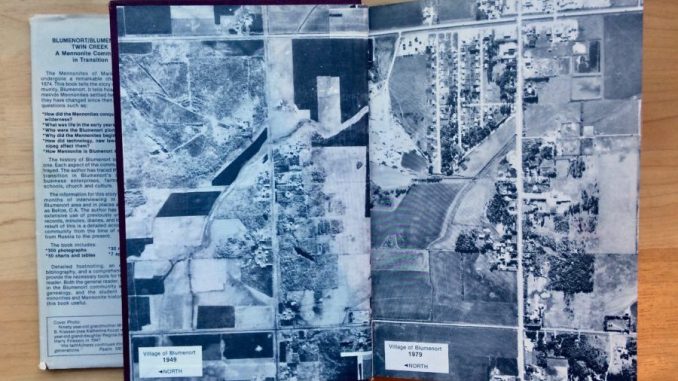
At the moment, at this very second, I’m reading Royden Loewen’s book Blumenort: A Mennonite Community in Transition. But I’m not reading it from cover-to-cover like you’re maybe supposed to. (I say “maybe” because I feel like volumes like this are okay to dip in and out of.)
Published in 1983, this book is well over 600 pages long. I don’t think there’s been an update. I mean, would an update be necessary? As it is, Loewen’s Blumenort is a beautifully detailed history of the area. And history doesn’t change.
Or does it?
I guess it depends on who’s telling the story, and who unearths new (quantifiable) information.
I haven’t done any of those things. I’m just reading certain pages for the first time.
In this case, I’m reading about David P. Reimer reminiscing about the time that the East Reserve villages broke up:
“Each farmer moved onto his own farm… With the disappearance of the village vanished the trumpet sound of the herdsman… Just as the herdsman’s trumpet was silenced, many other things that had been practised for hundreds of years in Prussia and in Blumenort for the first 36 years and had been considered traditional and economical, changed. The school children no longer had the school close by. They had to walk a long way or be driven to school. The neighbours were no longer easily reached. Previously, the women had been able to reach the neighbour’s yard by walking along a peaceful pathway through beautiful gardens and wooden gateways. And yet these villages broke up, an action which was justified for economic reasons.”
This whole “break up of the villages” thing kind of blows my mind. I mean, I can’t imagine how they could give up their land and just live collectively in the first place — I’m so born and bred into this whole individuality thing. And the settlers arrived here and they had to apply for land… they had their names on sections of land… but they ignored it and lived where the creek was, all in a row together. It’s so foreign to me that I’m enraptured with it. But something even more mind-boggling is how on earth they undid all of this. How, after several decades of this lifestyle, they unraveled all of it.
But it wasn’t that easy as a mere unraveling.
I’d figured they had meetings to decide who’d go where and who’d get what… but think about that. How messy. What a headache. There had been zero legal basis to their way of life. So, to break that apart in a way that everyone was cool with… ugh, there must have been a great many migraines resulting from figuring that all out.
You often hear about the whole jantsied vs ditsied thing — east vs west. People think we’re so different… but maybe we only see the differences because we’re so similar. If that makes sense. Anyway, here’s one of the ways in which there were indeed marked differences. I’ve posted before about my great-great-great-grandfather being kicked out of the church in Osterwick, West Reserve because he wanted to live on his own — that was an Old Colony thing. I think nearly every family with roots in the Old Colony West Reserve has a story like that somewhere in their family tree. Anyway, that is not how things played out in the East Reserve. Loewen states that Kleine Gemeinde church leaders here were actually the first to leave their villages! There was some opposition… but not from the leaders.
To balance this unabashed nostalgia, here’s a cold hard reason the ER villages lasted as long as they did: they absolutely dreaded the unmitigated headache of dividing the land! They had to be fair, and needed to reach consensus. I feel stressed just thinking about it. But they pushed through… and then the day arrived in which all the buildings began moving out of the village. And I can just imagine the shock to the spirit. I can tell you right now, I would’ve been upset.
Loewen writes: “Building after building headed out of the village, along the crude dirt roads to separate farmyards.”

Accompanied by the above photo, I begin to get a bit more of the picture. The abrupt change. I wonder how this impacted relationships and friendships.
I will read on!

